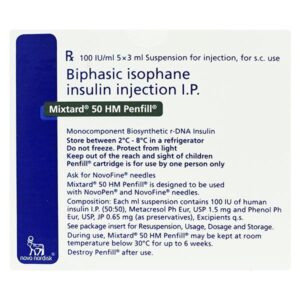ISOPHANE INSULIN + INSULIN RAPID ACTING
Isophane Insulin: Isophane insulin, also known as NPH insulin, is a type of intermediate-acting insulin used to control blood sugar levels in people with diabetes. It is typically used in combination with short-acting or rapid-acting insulins to provide a more stable and longer-lasting effect.
The mechanism of action of isophane insulin involves mimicking the effects of naturally produced insulin in the body. Insulin helps regulate blood sugar levels by facilitating the uptake of glucose from the bloodstream into cells, where it is used for energy or stored for later use. Isophane insulin has a slower onset and longer duration of action compared to rapid-acting insulin, providing a relatively steady and extended lowering of blood sugar levels.
The dose of isophane insulin depends on individual patient factors such as age, weight, activity level, and blood sugar control. It is usually injected subcutaneously (under the skin) once or twice a day, with the specific timing and dosage determined by a healthcare professional. Regular monitoring of blood sugar levels is necessary to determine the appropriate dose.
As with any medication, isophane insulin can cause side effects. Some common side effects include low blood sugar (hypoglycemia) which can cause symptoms like sweating, shakiness, confusion, dizziness, and rapid heartbeat. On the other hand, high blood sugar (hyperglycemia) can occur if the dose is insufficient. Other potential side effects include injection site reactions such as redness, swelling, or itching.
It is important to note that isophane insulin can interact with other medications, so it is crucial to inform your healthcare provider about all other drugs being taken, including over-the-counter medications and supplements. Additionally, it is recommended to inform your healthcare provider if you are pregnant, planning to become pregnant, or breastfeeding, as adjustments to the dose may be necessary.
Overall, isophane insulin is an effective medication for controlling blood sugar levels in people with diabetes. However, it is essential to follow the prescribed dose and regularly monitor blood sugar levels to achieve optimal and safe control of diabetes.
Insulin Rapid Acting: Insulin Rapid Acting is a type of medication used to control high blood sugar levels in individuals with diabetes. It is a form of insulin that is absorbed quickly into the bloodstream, which allows for rapid control of blood glucose levels after a meal.
Insulin is a hormone that is naturally produced by the pancreas and is required for the proper utilization of glucose by the body’s cells. In individuals with diabetes, either the pancreas does not produce enough insulin (Type 1 diabetes) or the body is unable to effectively use the insulin produced (Type 2 diabetes). Insulin therapy, such as Insulin Rapid Acting, helps to regulate blood sugar levels in these individuals.
The mechanism of action of Insulin Rapid Acting involves decreasing blood glucose levels by promoting the uptake and utilization of glucose by body cells, particularly muscle and fat cells. This is done by facilitating the transport of glucose from the bloodstream into these cells. Insulin also inhibits the liver from producing more glucose and promotes the storage of excess glucose in the liver.
The dose of Insulin Rapid Acting varies depending on individual requirements, and it is typically injected subcutaneously using an insulin pen or syringe. The dose and frequency of administration are determined by the healthcare provider, taking into consideration the individual’s blood sugar levels, meal plan, and overall health.
As with any medication, Insulin Rapid Acting may have side effects. Common side effects include hypoglycemia (low blood sugar), which can cause symptoms such as dizziness, sweating, confusion, and hunger. Other potential side effects include injection site reactions (redness, swelling, or itching at the injection site), weight gain, and fluid retention. It is important to monitor blood sugar levels regularly and work closely with a healthcare provider to adjust the dose as needed to minimize side effects and achieve optimal blood sugar control.
It is important to note that the usage, dose, and side effects of Insulin Rapid Acting can vary depending on the individual and their specific medical condition. It is recommended to consult a healthcare provider for personalized information and guidance on the use of this medication.
Cold chain products like insulins, vaccines etc. are available for pickup only.

